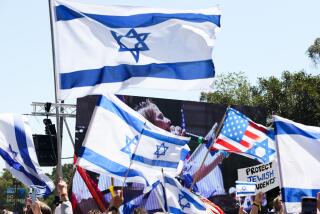‘Keep Christmas Out of School’
- Share via
The Christmas lights and decorations on display at the Mariners Elementary School in Newport Beach were removed at the suggestion of the school board president earlier this month.
While some parents defended the display as festive and an opportunity to show school spirit, others, including school officials and Jewish parents, objected, saying the lights were a religious expression that had no place on public school property. MAURA E. MONTELLANO spoke with a rabbi about the incident.
*
MARK S. MILLER
Rabbi, Temple Bat Yahm, Newport Beach
Ido not want to ascribe prejudicial or hostile motives to the people who were engaged in stringing the lights. I believe they are people of goodwill. But they were myopic in the effect of their action upon others who do not share their understandable zeal for Christmas observances.
I find at this time of year there are people who think the whole world celebrates Christmas and they are taken aback to find that there are those who do not share in the birth of the Christian savior.
Christmas is an inherently religious event. Therefore any activities--such as decorations--that are related to the observance of Christmas advance the Christian religion and should not be permitted in a public building. It takes a measure of sensitivity to others who feel disenfranchised by such an overt expression.
These are not just colored lights. They have a deep spiritual meaning. Even though Hanukkah is called the festival of lights, Jews recognize that the lights that we kindle are sacred, holy lights. Christians do not think any less of their lights. For me, to put a menorah in a public school is to put a deeply religious cherished symbol in a public building.
The Christmas lights represent Jesus as the light of the world who came to banish the darkness of sin and therefore these lights glorify, extol and revere Christmas and the Christian savior. Any decorations, pictures or music programs that have the significance for a particular religion should not be displayed, sung or performed in the school.
I do not think Christmas is a secular national American celebration. Christians trace the origin of their faith to Christmas. Calling these lights “winter decorations,” “festive decorations” or “season’s greetings decorations” really camouflages the true nature of Christmas, which is fundamentally a religious celebration.
I don’t embrace the compromise of giving Hanukkah equal time with Christmas. I don’t think that the introduction of Hanukkah compensates for the pervasiveness of Christmas in our schools. It makes Hanukkah into something it is not. I don’t believe our schools are Judeo-Christian in nature so the introduction of Hanukkah has no greater entitlement to observance in the public schools than does Christmas. I think America is committed to pluralism. Public schools are obligated to teach respect for the differences. It is not proper that non-Christian children are exposed to Christian doctrine, propagated by Christmas art, crafts, songs or the like. These are often innocently intended but these often cause tension and divisiveness and hurt children of other faiths or no faith. No matter how dressed up or watered down, these expressions tend to isolate and marginalize non-Christian children.
The mandate of schools is to advance education, not religion. There should not be a blending of the secular and the sectarian. It is one thing to learn about one another in courses that emphasize comparative religion and cultures, but quite another to adorn the school with the expression of one culture or one religion. There is an indirect coercive pressure that is brought to bear on the children.
The answer to one violation of the separation of church and state is not another violation such as introducing Hanukkah or Kwanzaa. There should be no celebration of Christmas in the public schools. The place for the propagation of religion is the home and the house of worship and in one’s dealings with one’s fellow human beings. But not by introducing the trappings of one’s faith in public schools.
More to Read
Sign up for Essential California
The most important California stories and recommendations in your inbox every morning.
You may occasionally receive promotional content from the Los Angeles Times.













